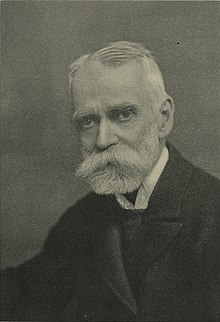Samuel Swett Green
| Samuel Swett Green | |
|---|---|
 |
|
| Born |
February 20, 1837 Worcester, Massachusetts |
| Died | December 9, 1918 (aged 81) Worcester, Massachusetts |
| Nationality | American |
| Alma mater | Harvard Divinity School |
| Occupation | Librarian |
Samuel Swett Green (February 20, 1837 – December 9, 1918) was a founding figure in America’s public library movement.
Considered by many to be the "father of reference work", laying the groundwork for widespread reform within the field, he opened his presidential address to the American Library Association in 1891 with the memorable words, "The function of the library is to serve its users."
Green was born in Worcester, Massachusetts, to the apothecary James Green and Elizabeth Swett. He was educated at Harvard, graduating in 1858. A few years later he attended Harvard Divinity School but did not graduate until 1864 due to health issues. Forsaking the ministry, he began his library career in 1867, when he was appointed director of the Worcester Free Public Library. The library was, in fact, heavily funded by Green’s uncle, Dr. John Green, who built an impressive collection before his death. As director, Green focused primarily on the technical aspects of librarianship, such as proper techniques in cataloging. In 1871 he took up the position of librarian, a position he held for thirty-eight years, and began introducing changes which would, eventually, be replicated in many other libraries throughout the country. For instance, the Free Library became the first public library in New England to remain open on Sundays.
Green was elected a member of the American Antiquarian Society in 1880.
In 1876, Green penned his highly influential article, "Personal Relations between Librarians and Readers,' which appeared in that year's American Library Journal (later known simply as Library Journal). He also presented this work at the 1876 Centennial Conference. Green stated that reference librarians should have four goals: teaching patrons about the library's functions and resources, as well as how to utilize them; answering patrons' questions; helping patrons select good reading material; and promoting the library to the greater community. In other words, the library has a duty to the community it serves and must respond to the needs of its patrons. To Green, people ought to feel welcome in their local libraries and librarians should facilitate this by being actively engaged with patrons and personalizing their service for each individual.
Green writes, "A librarian should be as unwilling to allow an inquirer to leave the library with his question unanswered as a shopkeeper is to have his customer go out of his store without making a purchase." He also encouraged objectivity in addressing patrons' queries, instructing librarians to "avoid religiously the practice of cramming the minds of young inquirers with one-sided views regarding questions in dispute." While librarians should do everything they can to assist their patrons, Green also warned against making these patrons too dependent. Librarians should function, in part, as teachers, helping people gain the skills needed to locate information for themselves.
...
Wikipedia
